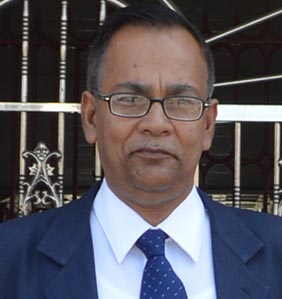Auditor General (AG) Deodat Sharma has said that the time is up for the Guyana Elections Commission (GECOM) to respond to the findings of special audits and he will soon be referring the matters to the Director of Public Prosecutions (DPP) for legal advice.
“I am taking my file now to the DPP. I am not waiting anymore,” Sharma told Stabroek News on Wednesday.
Sharma has been behind GECOM for several months now seeking responses to the audit reports. Following the appointment of Justice (retired) James Patterson as GECOM Chairman and Desmond Trotman as a GECOM commissioner, he provided them with copies of the documents, with the expectation that he would get timely responses.
The reports in question speak to the purchase of radio sets, the acquisition of ink toners and cartridges and the procurement of 2,400 nippers/pliers in 2015, which all exposed serious breaches of procurement rules at the entity.
Sharma told Stabroek News that he is preparing his file for the DPP. He said that to get the file ready will take some time and he averages that in three weeks he would be in a position to send it to the DPP for advice.
Among the other discrepancies picked up by Sharma and his office during the investigations were apparent contract splitting, the supply of goods before a contract was signed and in one case the appearance of a fake quotation purporting to come from a company interested in supplying radio sets.
A special investigation by the Office of the Auditor General into GECOM’s purchase of 50 radio sets for the 2015 general elections revealed procurement breaches among a host of other problems and a recommendation was made for the police to be called in for an in-depth probe and criminal charges if necessary.
The sets, costing $99.5 million, were taken possession of just days before the May 11th, 2015 general elections but were not used. The administrative procedures employed by GECOM for the purchase of the sets appeared to favour contractor Mobile Authority, although another interested supplier had the most responsive bid.
Though it had proceeded to procure the 50 radio sets from Mobile Authority, GECOM then entered another arrangement with the United Nations Deve-lopment Programme for the supply of 12 satellite phones on the grounds that “security reasons” prevented the use of the 50 radio sets on election day, Sharma’s final report said. This special investigation had its genesis in August, 2016, when the audit office’s team noticed discrepancies as it related to the purchase of High Frequency radios. The matter was drawn to the attention of Sharma, who instructed that a special investigation be done covering the period January 1st, 2015 to December 31st, 2015.
According to the report on the procurement of ink toners and cartridges, the special investigation revealed that 11 contracts for the supply of the items, worth $101.6 million, were awarded to the same supplier but were apparently split by GECOM to avoid Cabinet scrutiny. The report cited instances where the items appeared not to have been needed and contracts being signed after the supply of goods. It was recommended that the police be called in for a deeper examination and for criminal charges to be brought where necessary in relation in this particular matter.
Meanwhile, the report regarding the acquisition of the nippers states that the special investigation found that 2,400 nippers/pliers, which were procured by GECOM, were delivered on April 23rd, 2015, five days before the contract was signed. It concluded that $3 million could have been saved if Klein pliers were bought instead.
Patterson told this newspaper during an interview in January that he does not see the entity’s procurement practices as a major issue and that up to that point no decision was taken by the commission with regards to responding to the final reports.
“But I don’t see that as a large issue,” he had stressed, while informing that this particular issue has not been a subject of discussion during the meetings of the commission.
Gecom’s Chief Election Officer (CEO) Keith Lowenfield has maintained that the entity did not deviate from procurement rules in the acquisition of items that were the subject of the AG’s investigations.










